
Sorrel, also called common sorrel or garden sorrel, is a perennial herbaceous plant in the family Polygonaceae. Other names for sorrel include spinach dock and narrow-leaved dock.
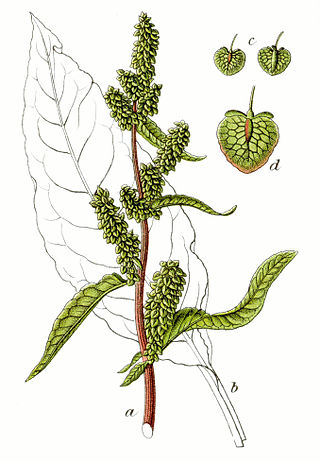
The docks and sorrels, genus Rumex, are a genus of about 200 species of annual, biennial, and perennial herbs in the buckwheat family, Polygonaceae. Members of this genus are very common perennial herbs with a native almost worldwide distribution, and introduced species growing in the few places where the genus is not native.

The lime-speck pug is a moth of the family Geometridae. It is a common species throughout the Palearctic region, the Near East and North Africa.

Rumex hymenosepalus, commonly known as canaigre, canaigre dock, ganagra, wild rhubarb, Arizona dock, and tanner's dock, is a perennial flowering plant which is native to the North American deserts in the southwestern United States and northern Mexico. It is a common food plant of the ruddy copper larvae.

Eupithecia linariata, the toadflax pug, is a moth of the family Geometridae. The species can be found in Europe and from Anatolia to Tajikistan and Iran.

Cnephasia communana is a moth of the family Tortricidae. It is found in Europe.

Calybites phasianipennella is a moth of the family Gracillariidae. It is known from all of Europe and most of Asia.

Eupithecia conterminata is a moth of the family Geometridae. The species can be found from Fennoscandia and the mountains of central Europe, through the Caucasus to southern Siberia.

Eupithecia denotata is a moth in the family Geometridae. The species can be found across the Palearctic from western Europe to Central Asia and China.
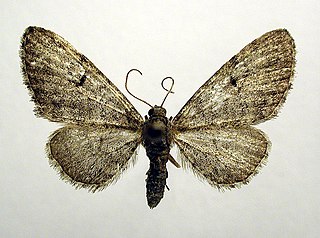
Eupithecia egenaria, the pauper pug, is a moth of the family Geometridae. It is known from almost all of Europe, except Portugal, Ireland and the southern part of the Balkan Peninsula.
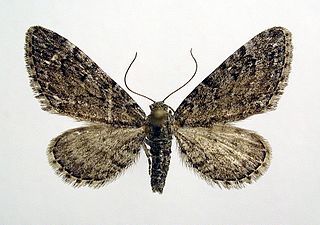
Eupithecia gelidata is a moth of the family Geometridae. It is known from northern North America, Greenland, northern Russia, Scandinavia and northern central Europe.

Eupithecia immundata is a moth of the family Geometridae. It is known from the mountainous areas of Europe, as well as northern Europe.
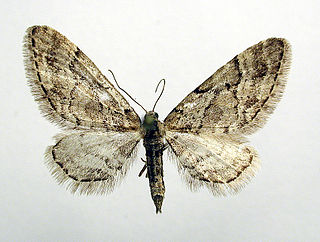
Eupithecia lanceata is a moth of the family Geometridae. It is known from most of the Palearctic realm, except for the south. The habitat consists of pine forests.

Eupithecia lanceata is a moth of the family Geometridae. It is found from northern Europe to Anatolia.
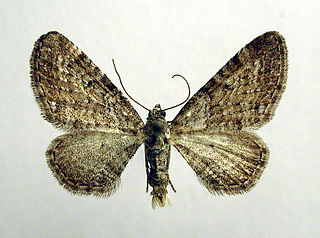
Eupithecia pernotata, or Guenée's pug, is a moth of the family Geometridae. The species was first described by Achille Guenée in 1857. It is known from the Alps, through Romania to southern Russia. It is also found in Finland.
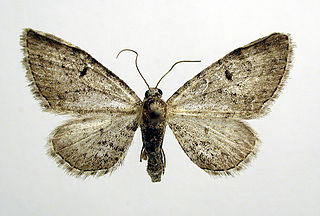
Eupithecia pimpinellata, the pimpinel pug, is a moth of the family Geometridae. The species was first described by Jacob Hübner in 1813. It is known from most of Europe to Morocco, Siberia, Kyrgyzstan, Altai, Mongolia.It primarily colonizes bushy places, forest edges, clearings, hedges, mountain slopes, embankments, railway dams and parks as well as semi-dry grasslands. In the Alps it rises to heights of 1800 metres.

Eupithecia selinata is a moth of the family Geometridae. It is found from Japan through the Amur Region, Siberia, the Urals, Caucasus and Russia to western Europe and from southern Fennoscandia to the Alps.

Eupithecia pygmaeata, the marsh pug, is a moth of the family Geometridae. It is known from most of Europe, western and southern Siberia, the Russian Far East, northern Mongolia and North America .The species primarily colonizes floodplain and disused forests, bogs, river banks and marshy meadows. E. pygmaeata reaches up to 1800 meters in South Tyrol.
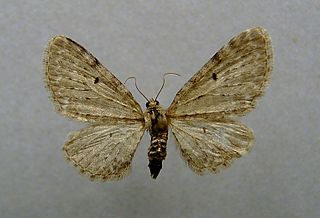
Eupithecia veratraria is a moth of the family Geometridae first described by Gottlieb August Wilhelm Herrich-Schäffer in 1848. It is found from the mountainous areas of Europe and Asia up to Japan.
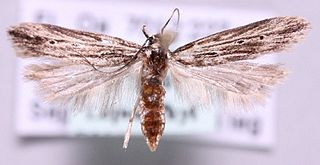
Monochroa palustrellus, the wainscot neb, is a moth of the family Gelechiidae. It is found in from western, central and northern Europe to the Ural Mountains and southern Siberia. The habitat consists of waste ground, dry pastures and sand-dunes.



















